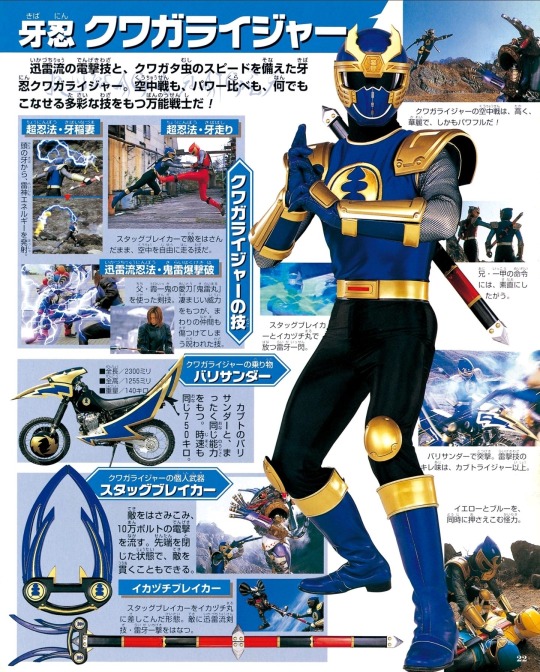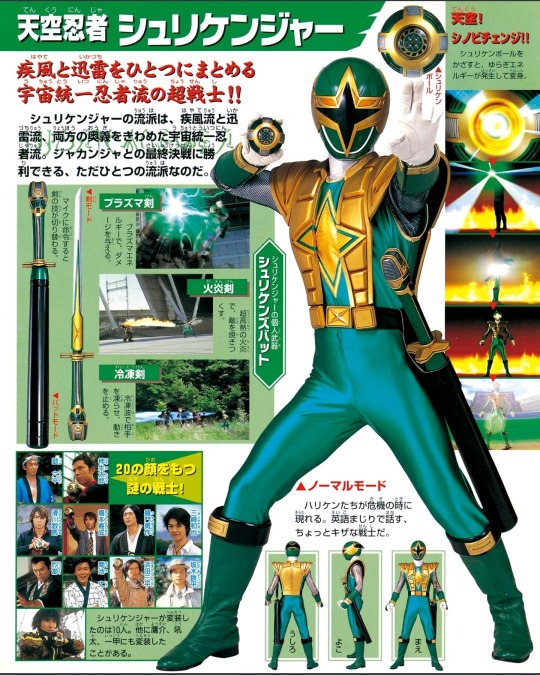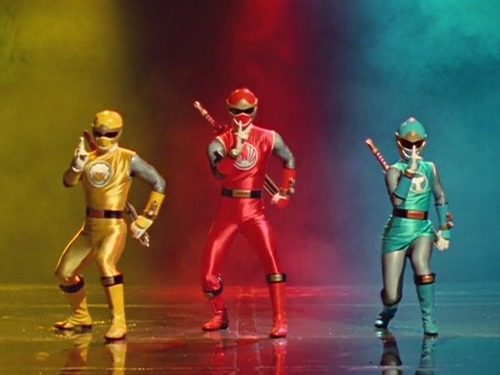#hey yo ninpuu sentai
Explore tagged Tumblr posts
Text






Ninpuu Sentai Hurricaneger
#ninpuu sentai hurricaneger#hurricanered#yousuke shiina#hurricaneblue#nanami nono#hurricaneyellow#kouta bitou#hurricanger#denkosekka gouraiger#kabutoraiger#ikkou kasumi#kuwagaraiger#isshuu kasumi#gouraiger#shurikenger#hurricaneger#super sentai#tokusatsu#hey yo ninpuu sentai
206 notes
·
View notes
Video
youtube
After a brief detour through Shanghai, London, and Berlin, it's time to land on Dai Teikoku Gekijou once again. The stage is set for our main cast to take the spotlight! Furthermore, these 5 songs (Track 7 to 11), are representative of each character's personality, traits, or even backstory (so... SPOILER alert?). Basically, the meat of this album. You'll likely hear these tunes in full once you've successfully secured their solo endings, right? And throughout, the BGM version usually accompanies them during the playthrough. Let the song show begins!
Otome Nandesu yo (I'm a Maiden) by. Sakura Amamiya (Ayane Sakura)
First on the lineup, is the leading lady herself, Sakura. And, I'm not sure how to put it, but from a purely subjective viewpoint, it's my LEAST favorite of this set. Elise left a big shoe to fill following her one-woman Opera. And Sakura just couldn't keep it together, that we had to step down into an idol-mode or some sort. Sorry, no offense to idol fans out there! Different people, different tastes, and my idol phase had gone over the rainbow. If I have to be honest, I only heard the short MV I posted above (first one released) only a few times, before forgetting about it completely. I can't really understand why. Perhaps, it sounded generic? Sakura Shinguuji's image songs weren't a stand out in "Sakura Taisen" and "Sakura Taisen 2" either. Nevertheless, I enjoyed both "Sakura" and "Haru ga Kuru". I have even recorded my own covers for those two songs! They told the tale of naivety and sincerity, of a country girl who went to the big city and burdened with the fate to be a hero. Comparing those to New Sakura's solo is unnecessarily unfair, but it also can't be helped. What is the message of this song? It's about a girl who reunites with her childhood friend (Captain Seijuurou, who else). But she's no longer fond of the idea of him seeing her as a younger sister figure. But she couldn't say it, because *drumrolls*, she's now a maiden. My memory is fuzzy, but I believe Kouhei Tanaka-sensei had already confirmed that this is, in fact, an "Imouto" song. Hence the reason why my interest is not that high. Fortunately, the song took a delightful tone the moment that harmonica came along (which was after the first chorus, on the 1:30 mark). I actually DID enjoy it more because of it. I also liked the bridge part, and how the final result sounded less like a pop song. But that final line? Why did it feel needy and/or desperate? *sigh* Oh well, at least Sakura already did wonders with "Shin GEKITEI". I admit Part 3 doesn't really start off on the right foot. But worry not! It definitely gets better...
Onna!! Matsuri no Kokoro Iki (Woman!! The Spirit of the Festival) by. Hatsuho Shinonome (Maaya Uchida)
Time to get fired up again! And seriously, I dare you not to shake your body or smile as soon as this song begins. Because you certainly would! On a glance, this sounded and showed the traces of being the Kanna Kirishima's style of the new generation. But with one obvious twist: It's... AWESOME!!! Kanna is a good character, but her solo numbers rarely appealed to my taste. Suffice to say, this song took the best parts of her numbers and blended it into one spot. I've always loved this song ever since the MV came out. And this full, almost-5-minutes, version with extra arrangements just sounded... MINDBLOWING. One would argue that a bulk of this song was instrumental, with Maaya Uchida as the Matsuri's (Festival) Miko shouting her commanding cues. That is undeniably true. But listen closely, and you'll get why I or anyone would dig this. If you have been keeping up with me, you'll know that traditional tunes from various countries fascinate me. So it should come natural that I'm a sucker to festival songs like this. Especially with that mix of heavy metal rock guitar building up towards the dynamic duo of the energizing Taiko beat and an iconic whistling of Shakuhachi that added the authenticity of things. Wagakki Band, anyone? Aaaaaahhhhh... and Kouhei-sensei just HAD to slip in that speedy CRAZY-sounding piano bit! *applause* Just like Lancelot's song, this made me feel like I was being transported to Tokyo or Kyoto, attending and witnessing an actual Summer celebration. Uchida, a good singer, didn't perform this in her smooth vocal style. But she shouldn't! This is something you sing at ease while plainly having fun. Being all out and letting loose is basically the key! For the first time in Sakura Taisen's music history, I've bumped into a song that I simply don't want to sing along. Instead, I would DIE for the chance to participate in that Taiko play. Oh my, I need to see this in a live performance. You TOTALLY need to hear this! And dance along if you will... PS: If there's any gripe about this, it's when Hatsuho and the background voices are yelling "Oisa!" (literally means "Hey!"?). It tends to sound "Oisa, Osa, Usa, USO, USO, USO!". "Uso" means "Lies", and ends up giving it a misogynist feel by accident. The message of this song is that a woman is the spirit of the festival. Girl power! Feminism! But then there's these choir of ALL MALE that seemingly shouts "Lies, Lies, Lies!". That's pretty contradictory, eh? I know I'm totally making too much of a big deal out of this, but it honestly bugs me out...
Ninja Azami (Azami the Ninja) by. Azami Mochizuki (Hibiku Yamamura)
We haven't left Japan, as indicated by another tune of Shakuhachi and Koto, preparing us for the next performer. It's a familiar tune that many have heard in "Naruto", "Ninpuu Sentai Hurricaneger", or other feudal Japan-themed series. And the title had already said it all. This is the biographical description of Azami, as Shin Hanagumi's resident ninja-in-training. But as soon as it entered the verse (as you could hear in the MV), the sensation changed pretty significantly. No longer a serious Shinobi song, it morphed into the franchise's usual playful little girl song. Yes, even though Azami is technically older than Iris Chateaubriand, Coquelicot or Rikaritta Aries! She mentioned her hobby on practicing the various ninja scrolls, and even her love to eat snacks like Manjuu during breaks. Yare yare... With just 3:28 minutes, this is the second shortest song after "Shin GEKITEI". Obviously, the tempo does play a role in that. Hibiku Yamamura is a Sakura Taisen fan, yet she had the shortest solo number in the album. Somewhat ironic, isn't it? Nonetheless, she did a fantastic job. In fact, her unique voice remains consistent throughout the album, and that's worthy to be praised. I liked the traditional Japanese feel in this, but it also had too many speaking lines for my taste. Still, I'll gladly take this bouncy and head-bopping fun tune over Sakura's anytime. PS: Both Yamamura and Ana's VA made guests appearances more than once during the monthly Teigeki Report, which apparently will still going next year (probably until the TV series airs?). So you can hear them sharing personal experiences and stories on those videos. It's insightful, that's for sure!
Kaereru Basho (A Place to Return to) by. Anastasia Palma (Ayaka Fukuhara)
Goodness! I've been itching to arrive to this song. A good song is one that tells a story. Just like the previous songs, this one does the same, but with a deeper meaning and values. Ana is most definitely the "sexy Onee-san" archetype of this game, complete with having a curvaceous figure (reminds me of Rangiku in "BLEACH", wait a sec...). But personality-wise, the Greek lady gave off this mysterious, unpredictable vibe. She's like a mix of mature Maria Tachibana, with a vibe of Glycine Bleumer and Soletta Orihime's European presence, but with a cloudy past of Hanabi Kitaouji, and the hidden sides of Reni Milchstrasse or Subaru Kujou. If I had to describe it in one word, she's puzzling. However, there's one trait that she's been constantly identified with: she's an actress. It thoroughly commanded the message of the lyrics. But I digress. Was the whole song really all about Ana's passion for acting? There seemed to be more than meet the eye. From what I gather, there's an underlying hint of a journey of sadness, past events or eras that had emerged and faded, beloved people that had come and gone. In short, she basically acted her way through the ups and downs of her life. A coping mechanism, perhaps? Laughing away loneliness, a facade of her true emotions. And what did she mean by "A Place to Return to"? Was it the stage, or acting, or just like many of previous Sakura Taisen's heroine: someone to go home to? Or someone who can finally discover and understand her real self? I need to either play the game or watch the TV series to confirm that. Now that I'm older (and wiser? Naaaah), this is my idea of a good song. It asks you to listen, pay attention, and also feel challenged to try to figure it out. This was the longest Shin Hanagumi and solo song of the album. You'll understand why it needed to be that long to be good. The moment that alluring piano intro kicked in, and the violin started to seep in, it's classy and elegant as hell. Ayaka Fukuhara stated that this was a challenge to sing, and indeed it is. It should be. Even though the vocal range wasn't as demanding as Elise's opera, the pitch work was exceptional! She gradually went from a lower tone to higher and higher. It sounded like the aura of the room changed every time another verse began (due to the modulation, as well as the flow of passion and emotions), seemingly depicting Ana's many masks. And those sharp notes? Oh my, oh my, OH MY!!! No wonder Subaru's VA, Mie Sonozaki (who is a prolific singer herself) congratulated Fukuhara on doing such a fine job. This is another highlight of the album for me and my favorite Shin Hanagumi character song by far. Now, where can I get the off-vocal version? Because I totally want to try singing this song... PS: Similar to Elise, voice-wise, Ana is one of my favorites due to her range and distinct pronunciation style. She can go mezzo-soprano and heavy, but also high and soprano. I strongly enjoyed that versatility is utilized wonderfully in this song.
Rondo (Round Dance) by. Clarissa Snowflake (Saori Hayami)
You're watching a European-based fairy tale romance. What happens at the end, when the one true love has been found and all evil that stands in the way has perished? They hold a gala, where everyone waltzes into a happily ever after... That is the core of this whole song, a composition that Kouhei-sensei described it as feeling "like a movie". As a character, Claris fancies herself reading books (nerd alert! Hahaha), and I think many of her scenes in the game takes place in the library. But she also writes stories and loves to fantasize about a paradise filled with mermaids and magical elements. Perhaps because she alone wields a magic book. And her dream is to dance with someone while surrounded by those things. Those are the essence of the simple but poetic lyrics. I admit, when I first heard it, I was taken aback by the decision to putting this track as the final Hanagumi song. But now it makes perfect sense. It easily serves as a calm and astonishingly perfect capper to a series of solo songs, a grand celebration to conclude a colorful parade. My knowledge of reed or woodwind instruments is poor, so I couldn't tell if it was an Ocarina or another type that played in the intro. I'm not sure if that's native to Luxembourg too. One thing for sure, the medieval melody would naturally pierce through your soul, until that graceful combo of Lute or acoustic guitar (again, sorry if I'm bad at names) and harp soothed you into a more familiar space. Then suddenly, the song changed tone halfway through and turned into full folk song mode. Yes, the Kouhei-sensei style I told you before. Someone on Youtube mentioned that this reminded him/her of Disney's "Tangled". Well, I can attest that the catchy interlude was very true to that notion. To think that this song arrived while "Frozen 2" is still playing. Such a great coincidence! Saori Hayami is a great singer, known for her gorgeous legato siren-like vocals. Just like Ana (oh hey, fellow non-Japanese Shin Hanagumi), I'm beyond happy that this song fully made use of her unique charm. Especially once it got into that royal ballroom dance chorus, reminiscent of Orihime's image song. It didn't take long for me to imagine Claris as the protagonist, dancing with her prince (or princess, if that's her thing. Right, Hallmark?) in a grand finale of her fictional story. Speaking of which, I'm still confused as to why Hayami's name is always placed at the end. Even though the promotions clearly showed that Claris is one of the first members of the team. Could it be that she's a "special cast member" type, like in Hollywood movies? That would make sense... Another highlight of the album, another personal favorite (that I've been humming and singing unconsciously on repeat), this clocked as the second-longest solo of the album. But just like the previous number, I doubt anyone would complain. You only need to close your eyes and just start swaying left to right, back, and front. Take your beloved person's hand, embrace him/her tightly, and just follow the musical flow. Dance the day or night away, with much joy and passion! PS: The official MV wrote the title as "RONDE". I still go with "RONDO" because pretty sure that's a typo, considering even the French (one of Luxembourg's official language) equivalent is "RONDEAU". Rondo itself is a musical form that refers to a theme that keeps coming back around. But in Japanese, the kanji can also be read as "RINBU" which means "Round Dance".
Next: the final part of the review, featuring voices old and new, and my overall impression...
Video is available on SEGA Official Youtube Channel. "Shin Sakura Taisen" is produced by SEGA, and RED Entertainment. Credits and copyrights belong to their respective owners.
#music#review#sakura wars#Sakura Taisen#shin sakura taisen#Shin Sakura Wars#project sakura wars#mind blown
0 notes
Text




Ninpuu Sentai Hurricaneger
#ninpuu sentai hurricaneger#hurricanered#yousuke shiina#hurricaneblue#nanami nono#hurricaneyellow#kouta bitou#hurricaneger#super sentai#tokusatsu#hey yo ninpuu sentai
73 notes
·
View notes